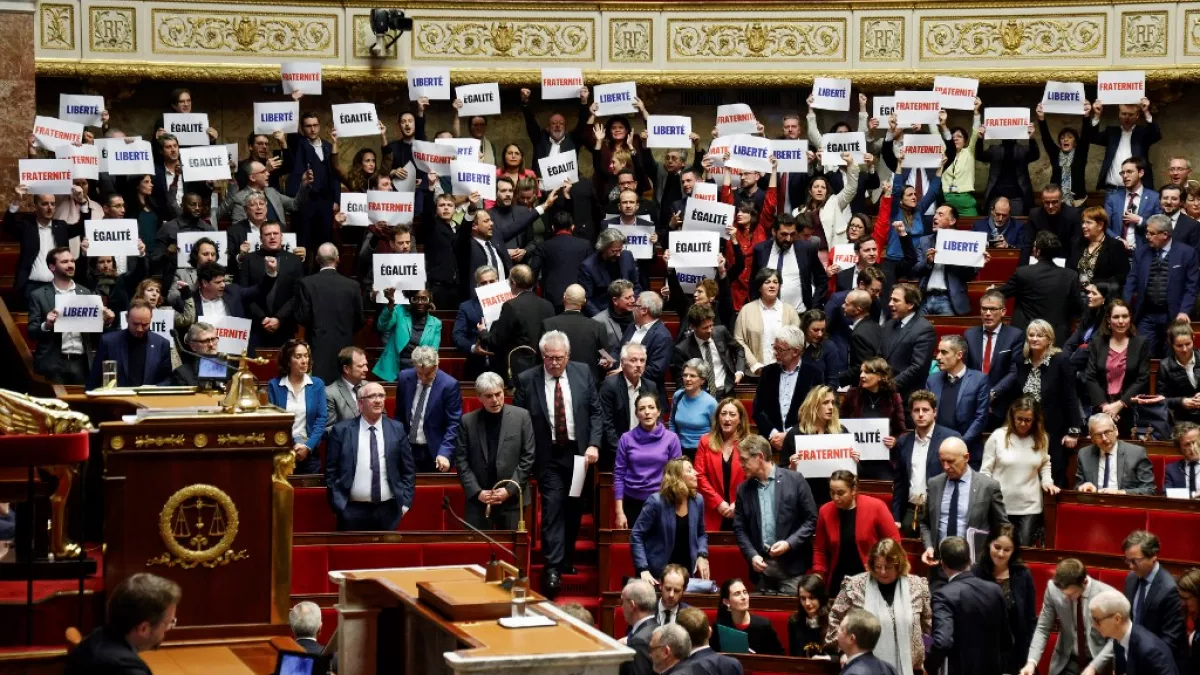
A controversial new immigration law has come into force in France that prohibits detention of children while at the same time easing removal procedures for many others.
Originally passed by France’s Parliament on 19 December, the law reflects recommendations from both the UN Committee on the Rights of the Child and UNICEF in affirming that the detention of a child because of the migration status of their parents “constitutes a violation of the rights of the child and violates the principle of the best interests of the child,” which is a cornerstone of the UN Convention on the Rights of the Child.
However, the law has sparked widespread criticism and protests because it also includes regressive provisions that may contravene the country’s adherence to human rights. Heavily influenced by the right-wing Les Républicains party and with support from the far-right National Rally, the version of the law adopted by Parliament included measures such as social welfare being provisional upon a longer period of legal residence in the country, greater abilities for the state to deport foreigners, and provisions that weaken asylum seekers’ rights of appeal.
After passage of the law in Parliament, it was sent for review to the country’s Constitutional Council, which announced on 25 January that it had struck down more than three dozen measures included in the law. Critically, however, most articles were removed not because they were found to be unconstitutional, but because they were too far removed from the law’s original intent–leaving the option open for them to be included in other pieces of legislation. As Forum Réfugiés stated:
“Most of the censorship (32 of the 37 provisions totally or partially censored, or subject to interpretation reservations) is however justified by the fact that the provisions, unrelated to the initial text, constitute ‘legislative riders’: this therefore does not prejudge their non-compliance with the constitution if they were subsequently presented within the framework of other texts.”
Amongst the removed articles were those that:
- Limit social benefits to foreigners who are employed–with those out of employment having to wait five years to receive support.
- Introduce tighter criteria for foreigners wishing to bring family members to France.
- Introduce migration quotas, which would have capped the number of immigrants over a three-year-period.
The final version of the law–which came into effect on 27 January–is considerably shorter than the version that was approved by MPs in December. While critics welcomed the scrapping of these articles, many nonetheless argue that the law remains “repressive” and “contrary to basic human rights.” La Cimade notes:
“The law composed of the remaining articles remains, despite everything, one of the most repressive since 1945. The suppression of categories protected against expulsions, the unprecedented extension of double punishment, the end of the stability of residence permits, the widening of inequalities in overseas territories, to name but a few, are all measures that are profoundly detrimental to the fundamental rights of people, which stigmatize, repress, exclude and endanger.”
Crucially, however, the law includes a ban (article 40) on detaining foreign migrant children. Families also benefit from the law, but only partially: In situations where a child is apprehended with both parents, authorities may detain one of the parents during a forced deportation procedure. The French Defender of Rights noted in February 2023 that parents are often accompanied by their children in detention–and children are even detained having been arbitrarily attached to unknown adults. “Despite the judgements of the European Court of Human Rights having condemned France on eight occasions, the presence of minors in detention remains frequent.” In 2022, 2,189 children were detained in France.
Many advocates have expressed concern that the years-long global campaign focusing narrowly on ending the immigration detention of children could have the unintended consequence of heightening the vulnerability of other at-risks groups. France’s new law may add fuel to these arguments. As the GDP’s Michael Flynn notes, “The immigration detention of children has been the low-hanging fruit of global migrant-rights advocacy campaigns. However, as the new law in France reveals, the success of this campaign may come with a steep price: harsher, more regressive measures for everyone else.”
In a letter providing instructions to relevant authorities on implementation of the new law, the Interior Ministry underscored the two-sided nature of the new law, stating that ending the detention of children “will permit the reinforcement of our abilities to detain for deportation purposes foreigners whose behavior represents a menace to public order.”


